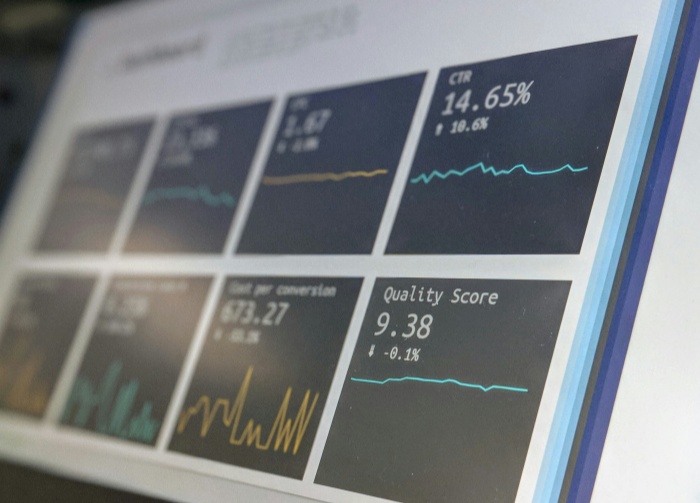AI Revolution: A Game Changer in Ecommerce
The recent AI boom has brought tools like ChatGPT and Google’s Gemini (including the google AI Overview on google I/O 2025), Claude and Grok into the mainstream. These advancements are democratizing tech, making it accessible to all and not just to Fortune 500 companies or MIT researchers. One sector that has been quick to embrace this evolution is ecommerce.
According to a 2022 IBM report, 35% of companies reported using AI in their business already, and an additional 42% reported they are exploring AI. If you're an ecommerce manager, you don't need to worry about artificial intelligence replacing you. However, someone savvy in AI will. This same principle applies across business functions—and if you're looking to catch up, there are excellent vocational training courses that teach foundational tech skills, including AI, digital marketing, and data analytics to help you stay competitive. Just as meeting room booking software has automated administrative tasks, AI is transforming ecommerce operations. If you're not integrating it, you're falling behind. That's because AI in ecommerce has become a game-changer, one of the biggest ecommerce trends revolutionizing how online businesses operate and engage with their customers. " Successful retailers integrate AI tools directly into their eCommerce development to create more intelligent, responsive, and competitive online stores.
Let's explore the potential of AI in ecommerce and how it can enhance your workflow, boost your career, and elevate your ecommerce business’ success.
13 Ways to Harness the Power of AI in Ecommerce
1. Personalization for an Enhanced Shopping Experience
Image search eCommerce allows ecommerce brands to capture and analyze visual preferences in real time, supporting personalized shopping journeys and smarter product suggestions. This customization increases retention and boosts conversion rates for businesses that successfully personalize their customers' experiences.
2. AI-Driven Visual Search for Product Recommendations
Online retailers can analyze customer preferences based on images they interact with or upload, helping them provide more accurate product recommendations tailored specifically for individual consumers. This capability is essential in e-commerce application development, and partnering with a mobile app development company can further enhance the implementation by ensuring the feature works seamlessly across platforms. It enhances the shopping experience and drives sales.
3. AI-Powered Chatbots for Superior Customer Service
Experience superior customer service with AI-powered chatbots, hosted on fast and secure ecommerce hosting for optimal performance. Implementing AI-powered chatbots, AI Agent or virtual assistants in the ecommerce industry has vastly improved customer service quality by providing 24/7 support through natural language processing (NLP).
4. Predictive Analytics for Optimized Inventory Management
Predictive analytics, powered by AI algorithms and big data processing capabilities, allow ecommerce leaders to optimize inventory management by analyzing past sales performance, customer purchase history, and external factors such as seasonal trends or economic indicators. You can leverage predictive analytics by syncing Shopify with BigQuery, a powerful data warehouse offering extensive forecasting capabilities. Additionally, businesses can strengthen these forecasting systems through AI software development, enabling more accurate demand predictions and smarter, automated decision-making.
5. Efficient Sales Copy Generation
AI writing tools like Straico can generate sales copy within seconds, requiring minimal editing from human writers. These tools generate multiple versions of text based on a given prompt, offering multiple options to choose from.
6. Image Creation and Enhancement
AI image tools can create a range of images for free, turning rough ideas into finished graphics, removing and replacing backgrounds, and creating quality images without models, green screens, or renting a studio.
7. Rapid Logo Design
AI tools can prototype endless logo ideas, bringing your ideas to life.
8. Abandoned Cart Prevention through Targeted Remarketing Campaigns
AI-driven remarketing campaigns target users who have abandoned their carts with personalized ads and incentives to encourage them to return and complete the transaction. Using a powerful ad maker, brands can quickly create tailored video and display ads that re-engage high-intent shoppers, reinforce product value, and drive conversions at critical decision moments, making platforms like Heyoz a smart choice for brands focused on results.
9. Tailored Content and Advertising Messages
AI in ecommerce can tailor content and advertising messages based on user preferences, browsing history,advertising intelligence, and purchase patterns.
10. Automated Invoice Reconciliation
AI, and more specifically, Natural Language Processing (NLP), can streamline invoice reconciliation, matching invoices from ERP systems to bank transactions, helping finance teams rely on productivity tools such as task management and CRM systems to reduce manual follow-ups and keep financial workflows organized.
11. Smarter Packaging Design Optimization
AI is revolutionizing how products present themselves in the real world. Modern packaging design agencies already use AI-driven consumer testing to analyze purchase intent, evaluate shelf visibility, and measure which packaging elements best capture attention. These insights allow ecommerce brands to refine visuals and messaging before launch, ensuring that every SKU on the digital shelf is optimized for performance. AI simulation tools can even predict how design changes will impact shopper behavior across marketplaces like Amazon and Walmart.
12. Intelligent Product Fulfillment and Logistics
The power of AI extends far beyond the digital storefront. Leading 3PL providers leverage AI to forecast demand, manage warehouse inventory, and route shipments more efficiently. Through predictive analytics and automation, fulfillment operations can identify bottlenecks before they happen and dynamically allocate resources based on order velocity and geography. This integration of AI within fulfillment not only improves speed and accuracy but also reduces operational costs and enhances customer satisfaction through faster, more reliable delivery experiences.
13. AI Recruitment Software for Faster, Smarter Hiring
AI Recruitment Software enables ecommerce companies to automate resume screening, shortlist candidates based on skill matching, and predict cultural and role fit using machine learning. By reducing manual filtering and accelerating interview scheduling, it shortens time-to-hire and improves talent quality across functions like customer service, warehousing, and marketing. With features such as chatbot-based pre-screening, sentiment analysis, and automated scoring, AI Recruitment Software helps fast-growing ecommerce brands scale teams efficiently, optimizing talent acquisition while minimizing bias and recruitment costs. When ecommerce teams move from candidate selection to onboarding and employment compliance—especially for roles based in India, platforms like Wisemonk can support the next step by handling contracts, payroll, and statutory requirements, ensuring new hires are brought on smoothly and compliantly.
Top AI Tools Every Ecommerce Team Should Consider
Here are some AI tools you can try to boost productivity and increase efficiency across every area of your ecommerce business:
●AI chatbots and recommendation tools
Chooch: AI vision tool for retail that helps drive higher revenue while creating a more enjoyable shopping experience for customers.
ViSENZE: A smart recommendation tool that uses machine learning to display products your customers will likely want to buy.
Google Cloud: Provides personalized recommendations based on the customer’s previous shopping experience and history. The Voice AI provider Leaping AI offers self-improving voice agents that can take care of customer support, help clients make a purchase or give personalized recommendations 24/7.
●AI tools for improving ecommerce operations
BigCommerce: Commerce-as-a-Service tool that (CaaS) enables you to create custom ecommerce solutions for your customers, powered by a modern platform with AI.
ClickPost: An AI-powered post-purchase solution designed to automate and streamline the entire returns journey for ecommerce brands. The platform integrates seamlessly with order, logistics, and customer systems, handling everything from returns initiation and tracking to approvals and resolution. By reducing manual effort and support tickets, ClickPost enhances operational efficiency, improves customer experience, and boosts revenue recovery through smarter returns processes.
Salesforce eCommerce Experience: AI-powered checkout flows, payment accelerators, real-time inventory visibility, advanced allocation logic, and order lifecycle management. Built on Salesforce development best practices, it helps brands deliver reliable, scalable digital storefronts.
testRigor: AI-driven test automation platform for e-commerce testing that lets ecommerce teams automatically generate, execute, and maintain end-to-end and regression tests—accelerating releases while ensuring a seamless shopper experience.
Testsigma: An agentic, AI-powered test automation platform designed to help e-commerce teams end-to-end testing. The platform supports web, mobile, desktop, and API testing, using plain English test creation through natural language processing (NLP), making test automation accessible for both technical and non-technical users.
●AI tools for writing ecommerce copy
Jasper & Kua.ai: Help you write copy for product descriptions, ads, social media posts, emails, etc.
Luppa AI: A complete AI marketing platform that not only generates content but also automates scheduling, repurposing, and performance analysis across email, blog, and social channels—ideal for lean eCommerce teams who want to move fast.
Grammarly: AI-driven editor that instantly catches grammatical errors in your text and helps you match a tone of voice, available as a Chrome extension, desktop app, and SaaS app.
Wordtune: Use this tool to spice up any sentence and clarify your message.
●AI graphic design tools
Canva AI Image Generator: a DIY graphic design tool that allows you to generate images from words.
Ocus: Easily improve and edit user-generated content.
Midjourney: Generate images from natural language descriptions.
Steve AI: Generate product specification videos or product demo videos from text.
Kua.ai: Present you with a more suitable AI image generator for ecommerce.
Descript: Create captivating video content for your store.
Veed AI Image Generator: Create professional-quality visuals and graphics directly from text with ease.
●AI tools for ecommerce pricing & financial management
Prisync: A Shopify dynamic pricing app that helps you monitor your competitors’ price moves from a single dashboard and import all your products with a single click.
Trovata: An automated cash management platform that enables you to use AI and ML to manage cash and all of its complexities with ease
Finally, when it comes to AI in ecommerce, there are infinite ways you can get started. But please, don’t bite off more than you can chew! Change takes time, and you’ll need to iron out the kinks, so start small and work your way up. I suggest identifying your biggest pain point and working from there. What processes can AI help you to automate that take up most of your time? Is there something you don’t have time to get to? For example, if social media marketing is an afterthought for you, you might want to try using an AI tool to help you generate posts.
Bonus: Explore how AI can innovatively create engaging social media content for you. Dive in for more comprehensive insights.
Join 200,000+ Sellers Growing with Kua.ai
You may also interested...

5 Benefits of Creating Beauty Photos and Makeup Close-Ups with AI

Why Automation Is the Backbone of Effective MarTech Strategies













